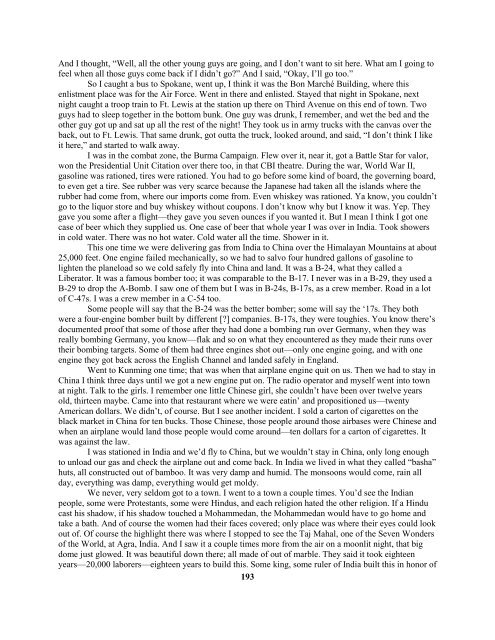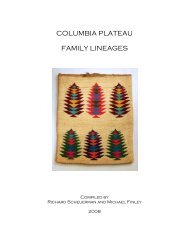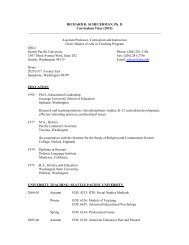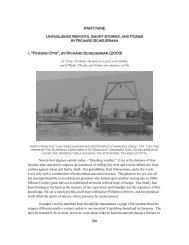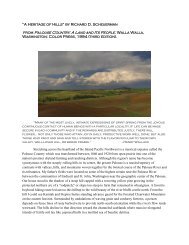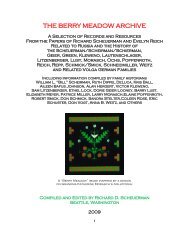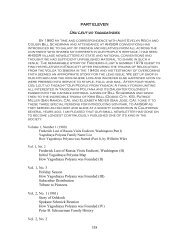PART SEVEN Oral Histories and Family Memoirs - Mountain Light ...
PART SEVEN Oral Histories and Family Memoirs - Mountain Light ...
PART SEVEN Oral Histories and Family Memoirs - Mountain Light ...
Create successful ePaper yourself
Turn your PDF publications into a flip-book with our unique Google optimized e-Paper software.
And I thought, “Well, all the other young guys are going, <strong>and</strong> I don‟t want to sit here. What am I going to<br />
feel when all those guys come back if I didn‟t go?” And I said, “Okay, I‟ll go too.”<br />
So I caught a bus to Spokane, went up, I think it was the Bon Marché Building, where this<br />
enlistment place was for the Air Force. Went in there <strong>and</strong> enlisted. Stayed that night in Spokane, next<br />
night caught a troop train to Ft. Lewis at the station up there on Third Avenue on this end of town. Two<br />
guys had to sleep together in the bottom bunk. One guy was drunk, I remember, <strong>and</strong> wet the bed <strong>and</strong> the<br />
other guy got up <strong>and</strong> sat up all the rest of the night! They took us in army trucks with the canvas over the<br />
back, out to Ft. Lewis. That same drunk, got outta the truck, looked around, <strong>and</strong> said, “I don‟t think I like<br />
it here,” <strong>and</strong> started to walk away.<br />
I was in the combat zone, the Burma Campaign. Flew over it, near it, got a Battle Star for valor,<br />
won the Presidential Unit Citation over there too, in that CBI theatre. During the war, World War II,<br />
gasoline was rationed, tires were rationed. You had to go before some kind of board, the governing board,<br />
to even get a tire. See rubber was very scarce because the Japanese had taken all the isl<strong>and</strong>s where the<br />
rubber had come from, where our imports come from. Even whiskey was rationed. Ya know, you couldn‟t<br />
go to the liquor store <strong>and</strong> buy whiskey without coupons. I don‟t know why but I know it was. Yep. They<br />
gave you some after a flight—they gave you seven ounces if you wanted it. But I mean I think I got one<br />
case of beer which they supplied us. One case of beer that whole year I was over in India. Took showers<br />
in cold water. There was no hot water. Cold water all the time. Shower in it.<br />
This one time we were delivering gas from India to China over the Himalayan <strong>Mountain</strong>s at about<br />
25,000 feet. One engine failed mechanically, so we had to salvo four hundred gallons of gasoline to<br />
lighten the planeload so we cold safely fly into China <strong>and</strong> l<strong>and</strong>. It was a B-24, what they called a<br />
Liberator. It was a famous bomber too; it was comparable to the B-17. I never was in a B-29, they used a<br />
B-29 to drop the A-Bomb. I saw one of them but I was in B-24s, B-17s, as a crew member. Road in a lot<br />
of C-47s. I was a crew member in a C-54 too.<br />
Some people will say that the B-24 was the better bomber; some will say the „17s. They both<br />
were a four-engine bomber built by different [?] companies. B-17s, they were toughies. You know there‟s<br />
documented proof that some of those after they had done a bombing run over Germany, when they was<br />
really bombing Germany, you know—flak <strong>and</strong> so on what they encountered as they made their runs over<br />
their bombing targets. Some of them had three engines shot out—only one engine going, <strong>and</strong> with one<br />
engine they got back across the English Channel <strong>and</strong> l<strong>and</strong>ed safely in Engl<strong>and</strong>.<br />
Went to Kunming one time; that was when that airplane engine quit on us. Then we had to stay in<br />
China I think three days until we got a new engine put on. The radio operator <strong>and</strong> myself went into town<br />
at night. Talk to the girls. I remember one little Chinese girl, she couldn‟t have been over twelve years<br />
old, thirteen maybe. Came into that restaurant where we were eatin‟ <strong>and</strong> propositioned us—twenty<br />
American dollars. We didn‟t, of course. But I see another incident. I sold a carton of cigarettes on the<br />
black market in China for ten bucks. Those Chinese, those people around those airbases were Chinese <strong>and</strong><br />
when an airplane would l<strong>and</strong> those people would come around—ten dollars for a carton of cigarettes. It<br />
was against the law.<br />
I was stationed in India <strong>and</strong> we‟d fly to China, but we wouldn‟t stay in China, only long enough<br />
to unload our gas <strong>and</strong> check the airplane out <strong>and</strong> come back. In India we lived in what they called “basha”<br />
huts, all constructed out of bamboo. It was very damp <strong>and</strong> humid. The monsoons would come, rain all<br />
day, everything was damp, everything would get moldy.<br />
We never, very seldom got to a town. I went to a town a couple times. You‟d see the Indian<br />
people, some were Protestants, some were Hindus, <strong>and</strong> each religion hated the other religion. If a Hindu<br />
cast his shadow, if his shadow touched a Mohammedan, the Mohammedan would have to go home <strong>and</strong><br />
take a bath. And of course the women had their faces covered; only place was where their eyes could look<br />
out of. Of course the highlight there was where I stopped to see the Taj Mahal, one of the Seven Wonders<br />
of the World, at Agra, India. And I saw it a couple times more from the air on a moonlit night, that big<br />
dome just glowed. It was beautiful down there; all made of out of marble. They said it took eighteen<br />
years—20,000 laborers—eighteen years to build this. Some king, some ruler of India built this in honor of<br />
193


